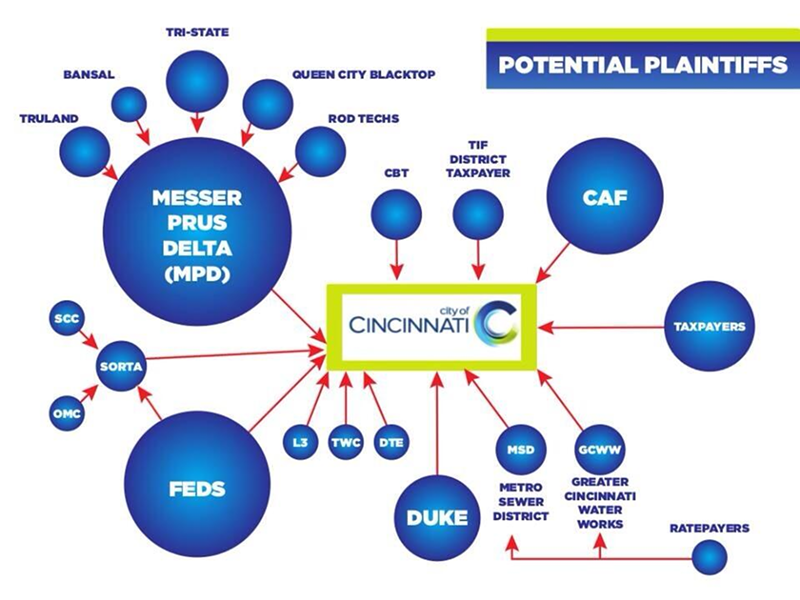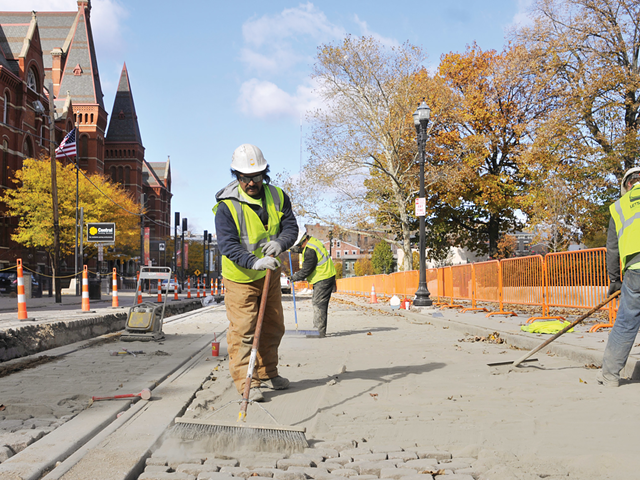Supporters of the $133 million streetcar project on Thursday night packed Mercantile Library and Fountain Square to start a two-week campaign that seeks to prevent the incoming mayor and City Council from canceling the ongoing project.
Turnout was particularly strong as supporters reached the 200-person capacity at Mercantile Library before the event started. Another 200 watched the event from the Jumbotron screen at Fountain Square, according to the event's organizers.
In attendance were several Over-the-Rhine business owners and residents; council members P.G. Sittenfeld, Chris Seelbach and Wendell Young; and several supporters of the project from around the city.
The goal of the event was to organize supporters and begin a lobbying campaign to convince the three perceived swing votes in the incoming council — Sittenfeld, David Mann and Kevin Flynn — to support continuing the project. All three have spoken against the streetcar in the past, but they told CityBeat they want to fully account for the project's cancellation costs, completion costs and potential return on investment before making a final decision.
Speakers urged supporters to contact the nine newly elected council members and raise awareness about the streetcar's benefits before Mayor-elect John Cranley, who opposes the streetcar project, and the new City Council take office in December.
Ryan Messer, a lead organizer of the effort to save the streetcar, spoke about the advantages of the streetcar project for much of the event. "This is a good economic tool that helps all of Cincinnati," he repeatedly stated.
Supporters have some empirical evidence to base their claims on. A 2007 study from consulting firm HDR found the streetcar project would generate a 2.7-to-1 return on investment over 35 years. The HDR study was later evaluated and supported by the University of Cincinnati.
Project executive John Deatrick acknowledges the 2007 study is now outdated and the city is working on updating the numbers. But he says the streetcar project is supposed to be viewed as an economic development vehicle, not just another transit option.
Supporters also warned of the potential costs of canceling the streetcar project. Hours before the gathering, Mayor Mark Mallory released a letter from the Federal Transit Administration that explicitly stated the city would lose nearly $41 million in federal grant dollars if the project were canceled, and another $4 million would be placed in the hands of Gov. John Kasich to do as he sees fit.
City spokesperson Meg Olberding previously told CityBeat that the city already spent about $2 million of the federal funds. If the project were canceled, she says the money would have to be repaid through the operating budget that funds police, firefighters and human services instead of the capital budget currently financing the streetcar project.
The operating budget has been structurally imbalanced since 2001, so adding millions in costs to it could force the city to cut services or raise taxes.
The FTA letter might already be playing an influence for at least one of the swing votes on City Council. On the elevator ride up to Mercantile Library, Sittenfeld told Seelbach and CityBeat, "I will say that today's news is a big gain in the pro-streetcar column."
Another threat for the city is potential litigation from contractors, subcontractors, taxpayers and Over-the-Rhine residents and businesses who invested in the project or along the streetcar line with the expectation that the project would be completed.
Litigation costs would also come out of the operating budget, according to Olberding.
"As a trial lawyer, this is actually appealing," said Democratic attorney Don Mooney. "For the city, not so much."
Supporters also outlined the potential damage that pulling from the project could do to the city's image, given that developers, businesses and the federal government have put their support and dollars toward the streetcar.
"Is Cincinnati that city that will dine you and wine you and leave you alone at the altar?" Young asked.
But if the lobbying effort, cancellation costs and threat of litigation aren't enough, supporters also presented one more option to save the streetcar: a ballot initiative. Mayor-elect John Cranley on Thursday told The Cincinnati Enquirer that he would be open to allowing some sort of streetcar referendum on the ballot.
The ultimate goal for supporters of the streetcar, beyond ensuring sustainable growth in the urban core, is to connect all of Cincinnati through a vast transit network, much like the streetcar lines that ran through Cincinnati before the city government dismantled the old system in the 1950s.
That provides little assurance to opponents of the streetcar project. Cranley and at least three hard-liners in the incoming City Council — Amy Murray, Charlie Winburn and Christopher Smitherman — claim the project is too expensive and the wrong priority for Cincinnati. Discussing more phases makes the project appear even costlier to opponents who are already concerned with costs.
In its comprehensive plan for 2040, the Ohio-Kentucky-Indiana Regional Council of Governments put the cost of various extensions — to the University of Cincinnati and surrounding hospitals, the Cincinnati Zoo, the Cincinnati Museum Center and the Broadway Commons area near the Horseshoe Casino — at more than $191 million, or $58 million more than the estimated cost for the current phase.
But if Cincinnati never completes the first phase of the streetcar project, supporters say it could be decades before other light rail options are considered.







